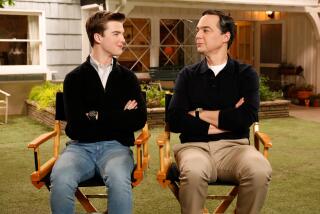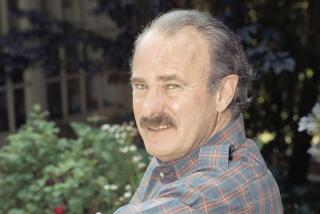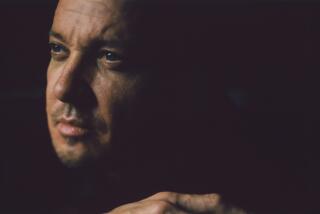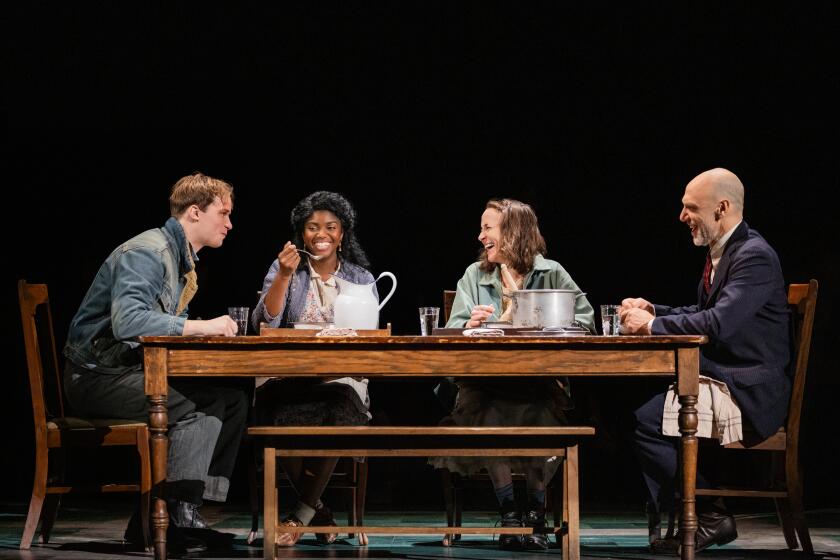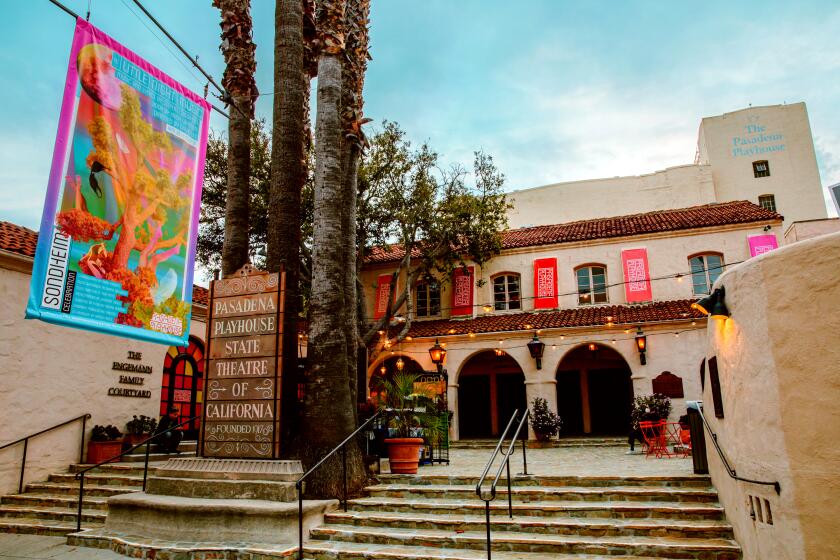Teachers Hit the Boards and Learn About Anxiety
Armed with the proper map, a San Diego culture vulture could have made a walking tour of a pair of landmark American musical theater presentations last Wednesday afternoon. Just past noon in front of the old Balboa Theater, cast members of San Diego Repertory Theatre’s “The Cradle Will Rock” gave lusty renditions of union songs from the 1930s before parading their audience into the Lyceum Stage for a preview performance of Marc Blitzstein’s 1937 agitprop musical.
An hour later at the Puppet Theater in Balboa Park, the San Diego Opera Ensemble put on Kurt Weill’s 1948 American folk opera “Down in the Valley” for local teachers participating in the San Diego Institute for Arts Education. While the acerbic musical style of the creator of “The Three Penny Opera” score served as a model for Blitzstein, by the time Weill had been assimilated into the post-war American commercial theater, his social satire had given way to folksy melodrama.
“Down in the Valley” was a hit with the teachers at the summer institute, however, especially since a dozen educators had been drafted into the production to sing the chorus parts. The main characters were sung by five aspiring opera professionals recently added to the opera company’s educational outreach program.
“We proved that twelve non-music teachers could learn the parts in four days, much to their surprise,” said William Roesch, San Diego Opera’s education director.
According to Roesch, part of the seminar’s goal was to equip teachers to teach the chorus parts to students when the opera education program brings “Down in the Valley” to some 50 schools across San Diego County next fall.
“I volunteered to sing in the chorus,” said high school teacher Greg Birch, “because I thought taking a risk would help me understand my students’ fear and apprehension when faced with an arts course.”
Birch, who teaches art at Mt. Carmel High School in Penasquitos, had not sung a note since bygone days of a one-unit course in college chorus. He said teachers in the fine arts need to minimize their students’ risk of failure, of appearing foolish, when undertaking an arts course in which they have minimal previous experience.
Roesch launched the San Diego Opera’s educational troupe last fall with a successful production of Rossini’s “Barber of Seville” condensed into a one-hour traveling show. He chose the Weill piece for this fall’s traveling show because it had an American theme, an English language libretto, and an easily assimilated folk music idiom.
“It’s kind of an Appalachian version of ‘Oklahoma.’ I wanted something that would not intimidate the students and would allow for some actual participation,” said Roesch. “The dramatic style is a little dated and it is a tragedy, but we kept the pace quick and the feeling upbeat at the end.”
While certain San Diego politicians recently have become infatuated with Soviet art and Russian performers, local music audiences are comfortably ahead of these latter-day converts. Some of the keyboard buffs who heard Soviet pianist Vladimir Krainev perform last fall with the Moscow Virtuosi in Symphony Hall returned Thursday evening to La Jolla’s Sherwood Auditorium to hear the brilliant virtuoso in a solo recital sponsored by the Batiquitos Festival.
From Thursday’s hefty program and the performer’s aggressive approach, it is tempting to describe Krainev as the Russian tank of piano playing. The immense scale and volume levels he chose for the modest 500-seat auditorium would have been better suited for a hall five or six times as large. Suffice it to say, there was nothing effete or apologetic about this piano player, who in his youth won a gold medal at the Moscow Tchaikovsky Competition.
Krainev played his seven Chopin works with that brand of defiant determination that enabled his countrymen to win the battle of Leningrad in World War II. If this was not the most satisfying or sensitive interpretation of the likes of Chopin’s Barcarolle, Op. 60, the G Minor Ballade, the D-flat Nocturne, and the ubiquitous A-flat Polonaise, it allowed no one to doze off in the stuffy auditorium.
To Prokofiev’s Second Piano Sonata, Krainev brought a meticulous urgency that certainly allowed the clever opus to speak for itself. The wit and charm, however, belonged to the composer, not the performer.
The chamber music arm of the Batiquitos Festival continues Thursday at Sherwood Auditorium with the well-known American string ensemble, the Fine Arts Quartet. A pair of performances of Mozart’s “The Marriage of Figaro” will be given by the Batiquitos Institute in Carlsbad at the Sammis Pavilion on July 8 and 10. This should be a boon for opera buffs on a budget, since admission to the Batiquitos operas is free.
Conductor Harry Ellis Dickson, long associated with the Boston Pops Orchestra, had been slated for a guest conducting stint with the San Diego Pops on July 20-23. That was before son-in-law Michael Dukakis became the Democratic Party’s presidential front-runner. When Dickson decided he wanted to be in Atlanta that week for the Democratic National Convention, the San Diego Pops obliged and quickly exchanged Dickson’s dates with another guest conductor on the summer schedule. Coincidentally, that conductor turned out to be Ned Battista of the Houston Pops, who had conducted at the inauguration of Ronald Reagan--at the behest of none other than George Bush. Dickson opens tomorrow with the Pops at Hospitality Point on Mission Bay.
More to Read
The biggest entertainment stories
Get our big stories about Hollywood, film, television, music, arts, culture and more right in your inbox as soon as they publish.
You may occasionally receive promotional content from the Los Angeles Times.
